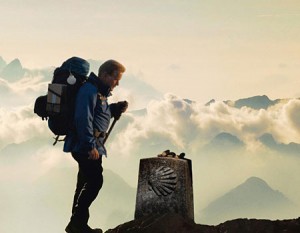Martin Sheen and Emilio Estevez brimmed with excitement as I met them in a swanky Georgetown hotel to discuss their passion project, the new movie “The Way.” Written by Estevez and starring Sheen, the film tells the story of a lapsed Catholic, Tom (Sheen), who walks an ancient pilgrimage route through France and Spain after the sudden accidental death of his son (Estevez). As he meets up with other modern day pilgrims along the Camino de Santiago, they form a small community of faith. The only thing the band of pilgrims has in common is a deep inner need and a lack of clarity on why they took on such a seemingly outdated task.
Sheen and Estevez, who is his son, were joined by David Alexanian, a producer of the film. With solid laughter and good hospitality, Martin Sheen played host, genially asking me if he could bring me a soda and lounging comfortably on the suite’s sofa while Estevez spoke softly and passionately. Clearly both men feel strongly about this project, about working together, and about the love they share for film and deeper questions of faith. Fortunately, I loved the film as well and was moved by its quiet focus on faith. I highly recommend it.
Here is our conversation about filmmaking, faith, and the power of family.
Patheos: You’ve been doing a bus tour with this movie. Have you been doing Q&A’s?
Estevez: Every screening. Sometimes twice a day. Sometimes secular and faith based, the reactions at the screenings are the same. I would say 60% of the Q&A’s are people just standing up and sometimes giving witness or testimonial.
Sheen: And thanking us.
Estevez: And thanking us for making the film. How often does that happen? Lots of times actors or directors will make a film and then spend the next couple of months hiding.
Sheen: [deep booming laugh]
Sheen: When someone is enthusiastic and proud about what they’ve done, you don’t have to urge them to brag about it.
Patheos: When I was looking you guys up, I saw that your father, your grandfather is from Galicia. Is there a connection?
Sheen: Yeah. Amazing. The cycle has been completed in a sense. It started as my father, his [Estevez’s] grandfather, coming to first Cuba and then the United States. And then I of course grew up here. And then his [Estevez’s] son, my grandson, going back to Spain and meeting his wife and living there.
Estevez: He [Sheen] went over there in 2003 on a fact-finding mission. Wanted to see the Camino and the cathedral. My son was working as his assistant on The West Wing, he was 19, they went over.
Sheen: We actually drove the Camino. I had this fantasy of doing it. I didn’t have enough time or information.
Estevez: No backpack. No walking stick, no shoes. Woefully unprepared. My son met this gal at what’s called a casa mural, like a bed and breakfast. That night at the pilgrim’s supper, the innkeep’s daughter came in the room and it was like [gasps] Love. Fireworks. As he describes it.
Sheen: They’re married now.
Estevez: He came home and said “I’m moving to Spain, Pop.” I was like, “What? What?” So I had to figure out a way to work there if I wanted to spend time with him. And his [Sheen’s] insistence that I write something for him was a way to continue that conversation.
Alexanian: There’s loads of stories about the making of it. It was against the odds getting it going, it was against the odds filming it, and now it’s against the odds distributing it.
Sheen: They would not approve anybody filming in the cathedral.
Patheos: But then you did get in?
Sheen: It’s another miracle. He [Estevez] ordered the crew to begin praying and lighting candles
Estevez: Anything. I was desperate. David was running around town, doing what he had to do, offering up his firstborn, his first three.
Sheen: [deep laugh]
Sheen: 48 hours before we came, they said ok.
Patheos: Pilgrimage, though. Here you have this full circle family story and yet you chose to make it about pilgrimage. I connected because I’ve been on pilgrimage [to Jerusalem]. I had this experience of “Why am I here?”
Estevez: Aren’t we all pilgrims? If we didn’t come over on the Mayflower, we came from somewhere else.
Patheos: It’s such an ancient thing to do, and yet you connected it to modern life.
Sheen: You don’t have to go to Jerusalem or Mecca or Santiago to go on pilgrimage; you go in your own heart. But it is more conducive to get you out of your normal, everyday life, because you’re forced to deal with something new and you have to deal with something new within yourself. So pilgrimage is about a person preparing and packing all their stuff and carrying it. What invariably happens is they begin to discard stuff because they’ve overpacked. And they can’t give it away to other pilgrims because they’re doing exactly the same thing. In the refugios along the way, you see the libraries in all languages, people have left, you see things books, clothes, shoes everything. And that happens.
Sheen: And then the second stage of the pilgrimage begins, the transcendence, the inner journey, where you begin to let go of your own negativity and darkness and you come to grips with this one you have not made peace with, you let them out of the cell of your heart, and this one out of the dungeon that wronged you as a young person and you can’t forgive and they need to be punished more, no, no, it’s time to let them go. You begin to let go of judgments and envies anger and resentment and all the negativity that keeps us from being human, keeps us from being free and knowing ourselves, that’s the real pilgrimage. That’s what lasts. That’s the transformation that’s happening. You have to do this yourself. Nobody can carry your load. Nobody can walk in your shoes. You’re on your own. You have to do it yourself. But you cannot do it without community. That’s pilgrimage.
Estevez (teasing): Period.
Sheen: There’s a period. Sorry. They say I’m a windbag and I’m not going to say if it’s true.
Estevez: We’re trying to get him to use periods instead of commas.
Sheen: Did I say “It’s an effort to unite the will of the spirit with the work of the flesh?”
Estevez (laughing): Not yet.
Sheen: That’s pilgrimage.
Alexanian: It’s a timeless backdrop, this camino, but it’s a modern experience too. You have people who have just lost their job or they’ve separated. And they’re taking this walk to reset as we would say today, but clearly they’ve been doing it for a thousand years. What I think is unique is we have all these devices to keep us connected, but in truth we’ve never been so disconnected. And I think we more than ever need to shed those things and spend time on some sort of pilgrimage whether as you say it’s in your heart or simplifying your day here. But they’ve been doing this sort of things for over 900 years for a reason. We as human beings over time have become too wound up and we need to become unwound.
Patheos: You’ve talked a lot about the role of the pilgrim. What’s the role of God in the pilgrimage?
Sheen: Well we don’t have much without God. God comes in so many different forms. It’s the genius of God to choose indwelling where we least likely look. Inside of us. God converts us. We don’t convert to god. We awaken and go “I found God” or “I’m converted,” but God was there before we were born. God was there when He formed the earth. Our ways are not Yahweh’s ways. The God of scripture. Whether you put the name on it specifically, God, the One, the Other, the cosmos, the universe, whatever it is…the mystery.
Patheos: This movie was about an intensely religious subject. But you have this line “Religion has nothing to do with it.”
Estevez: Well, I tried to find that balance. This scene with his [Tom’s] parish priest in the beginning, “Would you like to pray with me?” and he says “What for?” That would never happen in this man’s [Sheen’s] life, it had to happen in Tom’s life. There had to be a place of hopelessness for him for conversion to happen. I think the film, the story, the script, the character for him [for Sheen] is the closest he’s every been able to play to who he as a man, as an actor, as a human being.
Sheen: Absolutely. Very true.
Estevez: He’s not an army assassin, or a cold blooded killer. He’s not…
Patheos: President…
Estevez: President, although he likes to think he is.
Estevez: I’m a work of progress in terms of my faith. My mother likes to say that. She was raised Southern Baptist, but left the church. He [Sheen] was raised devout Catholic and through their union, he left the church. So, I’ve heard a lot of arguments about religion, but they never talk spirituality. And yet, my mother is one of the most spiritual people I know.
Sheen: She’s the only truly honest person. She loves the truth, the whole truth, all the time.
Alexanian: I would assume there are fewer people that are devout than not. When Emilio handed me the screenplay for the first time, what appealed to me is that it was not heavy handed in any way. That makes it accessible. You don’t want to watch an expert do something. That’s boring. It’s interesting to watch four people who are like us. My friends or people I’ve spoken to say they can identify with one or more of the characters. I don’t know if I’d identify with somebody who was devout. That would probably throw me out of it. I think this film invites people who are working on it. I think most of us are.
Patheos: We have Tree of Life, Higher Ground, Of Gods and Men, Machine Gun Preacher, True Grit. Is there a thawing going on in Hollywood where it’s ok to talk about faith?
Sheen: You know, really and truly, we’re about as far away from Hollywood as you can get. We don’t have access to studios. We took this to studios and they had not a clue.
Estevez: They may today.
Sheen: We were trying for three years.
Estevez: They may take a different look at it than they did years ago. I think it’s just a different time now. If Hollywood feels like they’re going to make money at something, they go for it. The issue we have, is that if that’s all Hollywood is interested in, not raising the bar, but just simply making money, I think the faith based community is going to reject it.
Alexanian: They can smell it.
Estevez: They can smell it. And in fact, we met people along the road last year, Evangelicals, Catholics, who said “if this is your heart, if you are true in showing us your heart, we’ll go with you. But if you’re disingenuous, don’t bother knocking.”
Alexanian: You can’t set out to make an inspirational movie. It’s sort of like opening up a restaurant to make money. If you don’t make the best pasta dish that anyone’s ever tasted, that’s what you have to do. If you don’t do it, you’re gonna be less than who you are, who you’re supposed to be. This was a film that had to happen
Estevez: We couldn’t not make this film.
Alexanian: This was a film that had to happen. As Martin said, we’re not part of the Hollywood system.
Sheen: Not that we didn’t try.













